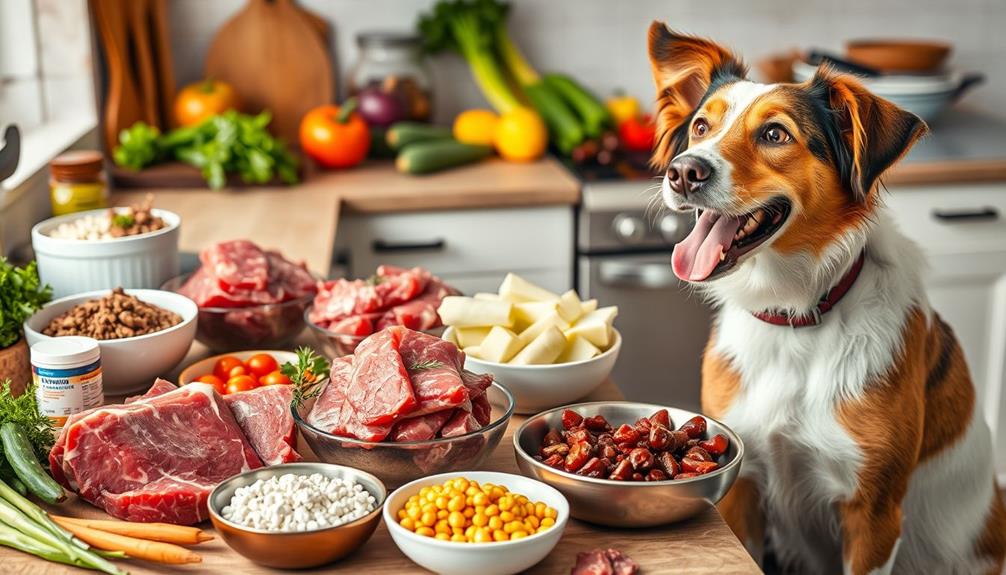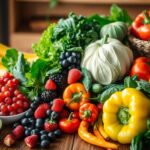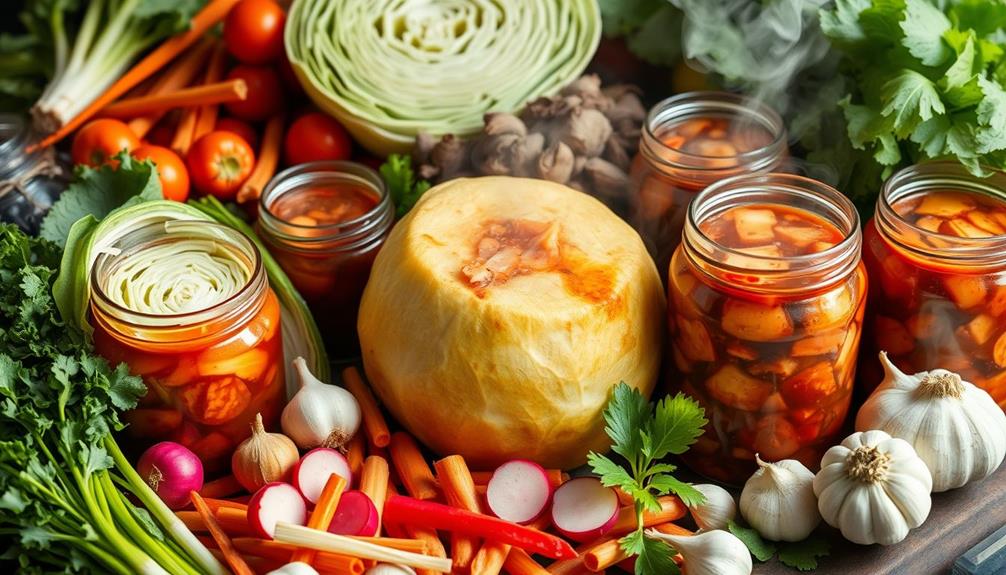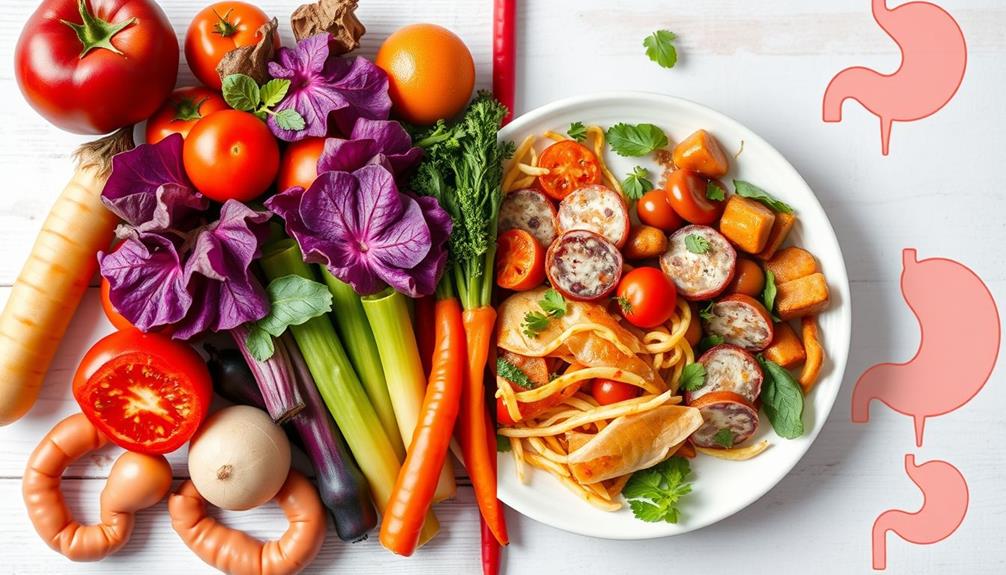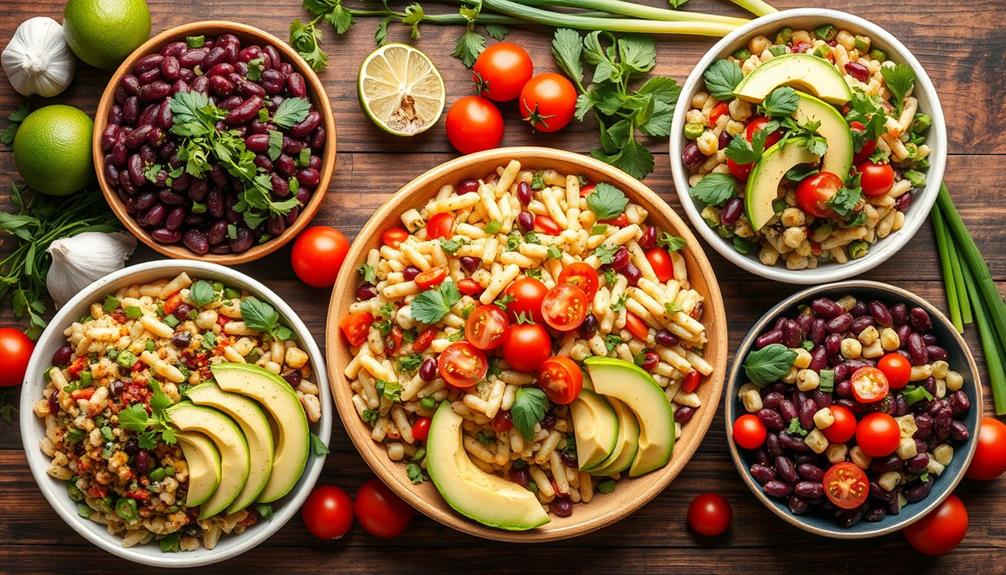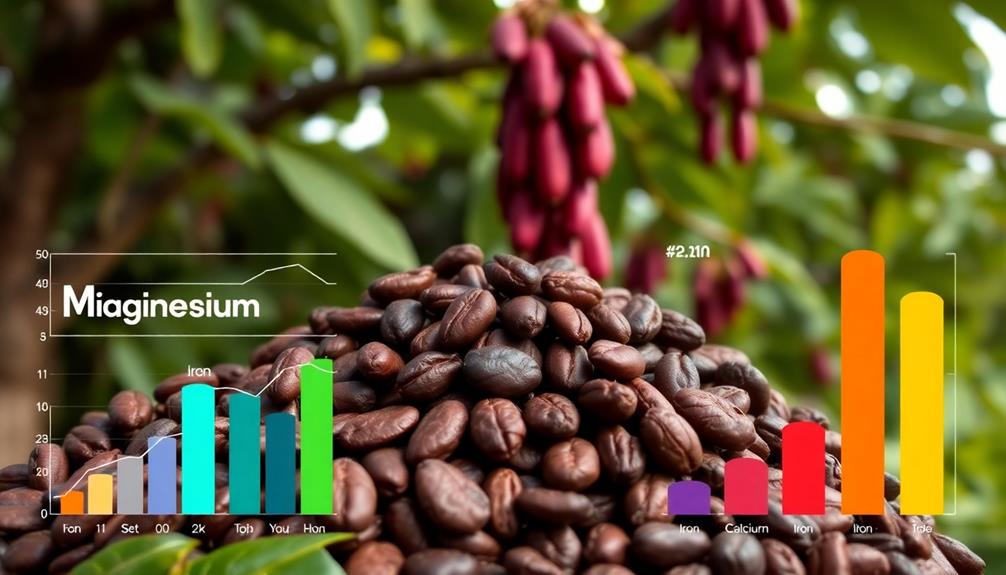You should be cautious about eating raw food during pregnancy. Raw fish, shellfish, and eggs may harbor harmful bacteria and parasites, which can seriously harm fetal development. Foods like raw sprouts also carry significant contamination risks. Instead, focus on cooking meats to safe temperatures and choosing pasteurized dairy products to reduce bacterial exposure. Always wash fruits and vegetables thoroughly before eating, and avoid high-mercury fish to protect your baby's brain health. By following these safety tips, you can better guarantee a healthy pregnancy. You might want to explore more about safe food practices and options to weigh.
Key Takeaways
- Avoid raw fish and shellfish to reduce the risk of harmful bacteria and parasites that can affect fetal development.
- Steer clear of raw eggs and sprouts, which may contain Salmonella and pose food poisoning risks during pregnancy.
- Consume only pasteurized dairy products to eliminate the risk of Listeria and ensure safe nutrient intake for both mother and fetus.
- Limit seafood to low-mercury options, such as salmon and shrimp, to protect fetal neurological health while enjoying the benefits of fish.
- Maintain strict kitchen hygiene by washing hands, surfaces, and all produce thoroughly to prevent foodborne illnesses during pregnancy.
Risks of Raw Foods
When it comes to eating raw foods during pregnancy, what do you need to know about the risks? Consuming raw fish, like sushi and sashimi, poses significant risks due to harmful bacteria and potential parasitic infections. These can adversely affect fetal development and lead to neurological issues.
Additionally, understanding common financial terms can help you manage expenses related to your pregnancy health. Raw seafood, particularly shellfish, is also dangerous; it can harbor pathogens that cause severe gastrointestinal illness, putting both you and your baby at risk.
Raw eggs are another concern. They can contain Salmonella, which may lead to food poisoning, causing symptoms such as fever and diarrhea that can be harmful to your developing fetus.
Similarly, raw shellfish, including oysters and clams, are notorious for carrying dangerous bacteria.
You should also avoid raw sprouts, like alfalfa and mung bean sprouts, as they're particularly susceptible to bacterial contamination, including Salmonella. The humid conditions during sprouting make them a breeding ground for harmful bacteria.
Safe Cooking Practices

To guarantee the safety of you and your baby during pregnancy, practicing safe cooking techniques is vital. Always cook meats to safe internal temperatures: 165°F for poultry, 160°F for ground meats, and 145°F for whole cuts. This step is essential to eliminate harmful bacteria that could pose risks to your health, similar to the importance of early detection when it comes to breast cancer symptoms.
When reheating processed meats like hot dogs or deli meats, use a food thermometer to verify they're steaming hot. This helps reduce the risk of listeria infection. To avoid cross-contamination, use separate cutting boards and utensils for raw meats and ready-to-eat foods, and wash all kitchen tools thoroughly after each use.
Don't forget to thoroughly wash fruits and vegetables under running water to remove pesticides and potential pathogens, making them safe to eat, especially if you're consuming them raw.
Always refrigerate perishable foods promptly, and store leftovers in shallow containers within two hours to minimize the growth of harmful bacteria. By following these safe cooking practices, you can enjoy your meals while keeping you and your baby protected.
Handling Dairy Products
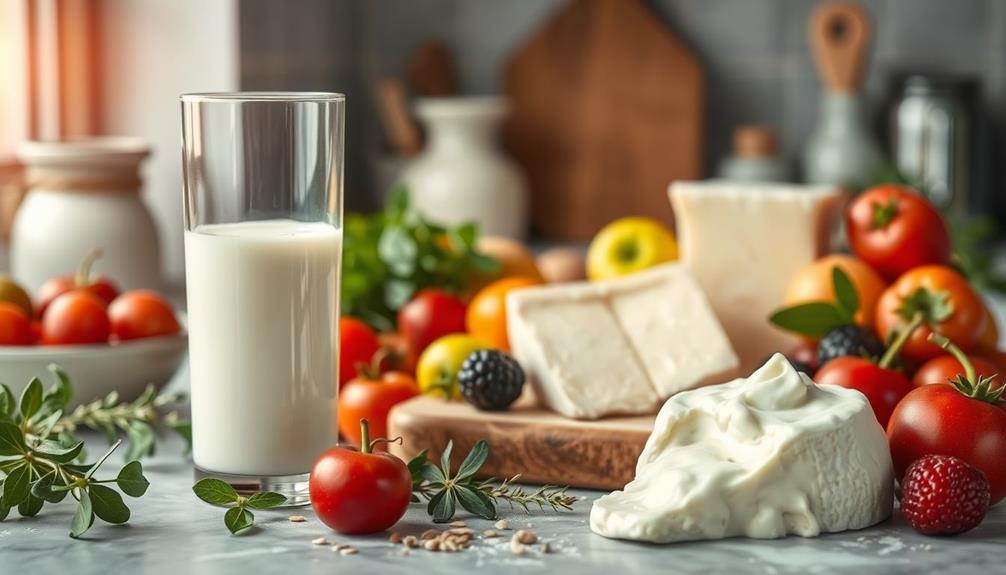
When you're pregnant, it's essential to choose dairy products carefully.
Dairy can be a source of important nutrients, but it's important to guarantee safety during this time. Always opt for pasteurized options to reduce the risk of harmful bacteria like Listeria and Salmonella.
Potential side effects from unpasteurized products can pose considerable health risks to you and your baby, so be especially cautious with soft cheeses and unpasteurized milk.
Pasteurization Importance
Understanding the importance of pasteurization is essential for guaranteeing your safety during pregnancy. Pasteurization heats dairy products to eliminate harmful bacteria, making them safer to consume. Unpasteurized dairy, like raw milk and certain soft cheeses, can harbor pathogens such as Listeria, Salmonella, and E. coli, which pose considerable health risks to you and your unborn baby.
To help you make informed choices, here's a quick comparison of pasteurized versus unpasteurized dairy products:
| Dairy Product Type | Safety Level |
|---|---|
| Pasteurized | Safe for pregnancy |
| Unpasteurized | Risk of foodborne illness |
The FDA strongly advises against consuming unpasteurized milk and dairy products during pregnancy. Always check product labels for "pasteurized" to minimize exposure to harmful bacteria. Soft cheeses like brie, feta, and queso fresco should only be consumed if they're made from pasteurized milk. By prioritizing pasteurization, you can greatly reduce the risk of foodborne illness and guarantee a healthier pregnancy.
Soft Cheese Precautions
Soft cheeses require special attention during pregnancy, especially those made from unpasteurized milk. You should avoid soft cheeses like brie, feta, and queso fresco because they can harbor listeria, a bacterium that poses serious health risks during pregnancy.
Listeria contamination can lead to severe consequences, including miscarriage and stillbirth, making it vital to guarantee the soft cheese you consume is made from pasteurized milk. Individuals with emotional dysregulation, such as those with Borderline Personality Disorder, may also experience heightened anxiety around food safety, further emphasizing the importance of being cautious about dietary choices.
Always check labels before purchasing any soft cheese. Pasteurization effectively eliminates harmful bacteria, making these cheeses safe to eat. When enjoying cheese-based dishes, opt for those with pasteurized ingredients to further reduce your risk of foodborne illness.
Proper storage is also important. Keep soft cheeses in the refrigerator and consume them before their expiration date to minimize health risks.
Following these vital safety tips will help you enjoy your pregnancy while safeguarding the well-being of both you and your baby. Remember, prioritizing food safety is key during this important time!
Unpasteurized Milk Risks
Unpasteurized milk poses serious risks during pregnancy, as it can harbor harmful bacteria like Listeria, Salmonella, and E. coli. These pathogens can lead to severe health complications for both you and your baby, including miscarriage, stillbirth, or serious illness in newborns. To protect yourself, it's essential to choose pasteurized dairy products, which effectively eliminate harmful bacteria without compromising nutritional quality.
| Bacteria | Associated Risks | Symptoms |
|---|---|---|
| Listeria | Listeriosis, miscarriage, stillbirth | Flu-like symptoms |
| Salmonella | Gastroenteritis, severe illness | Diarrhea, fever |
| E. coli | Hemolytic uremic syndrome, kidney failure | Severe abdominal cramps |
Always check labels to verify that the dairy products you consume, especially soft cheeses and fresh milk, are pasteurized. Consuming unpasteurized milk greatly increases the risk of infections like listeriosis, which can be particularly dangerous for pregnant women. Remember, making the safe choice in dairy can help you avoid serious health risks during this vital time.
Mercury and Seafood
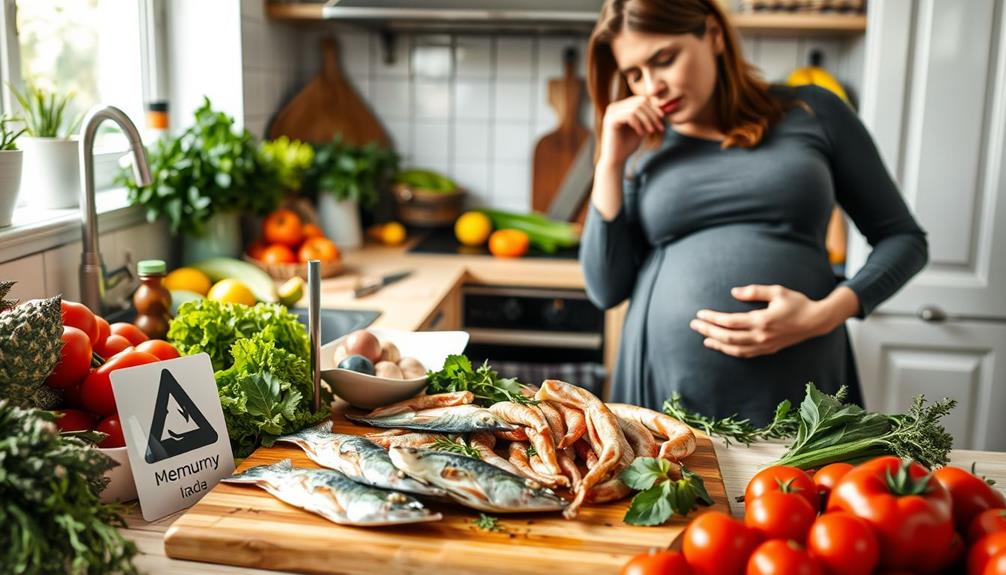
Avoiding high-mercury fish is essential when you're pregnant, as these fish can pose serious risks to your baby's development. Fish like shark, swordfish, king mackerel, and tilefish contain elevated levels of mercury, which can harm fetal neurological health.
Instead, focus on low-mercury seafood options such as salmon, catfish, and shrimp. The FDA recommends consuming 8-12 ounces (224-336 grams) of these safer seafood choices each week. Additionally, consider incorporating other dietary adjustments to support health during pregnancy, such as avoiding high-purine items that can increase uric acid levels gout nutrition tips.
Be cautious with raw fish and shellfish, including sushi and ceviche, as they carry significant risks due to potential contamination with harmful bacteria and parasites. Cooking seafood to an internal temperature of 145°F (63°C) effectively eliminates these pathogens, making it safe for you during pregnancy.
Additionally, always check the source of your seafood. Fish from contaminated waters can introduce additional health risks, especially for pregnant women.
Prioritizing low-mercury seafood and ensuring proper cooking methods will help you enjoy seafood safely during your pregnancy while supporting your baby's healthy development.
Importance of Hygiene
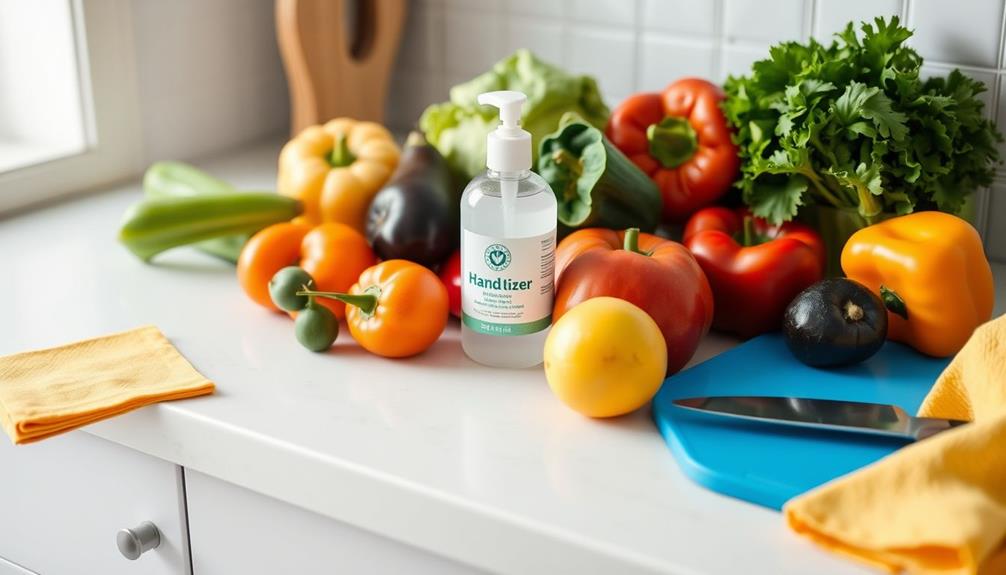
When you're pregnant, maintaining proper hygiene is essential for your health and your baby's. This includes ensuring that your kitchen environment is clean and organized to prevent any contamination, similar to how preventing cross-contact on prep tables is vital for food safety.
Make sure you wash your hands thoroughly with soap and running water before and after handling food to keep harmful germs at bay.
Using separate cutting boards for raw meats and ready-to-eat foods also helps prevent cross-contamination, ensuring safe food preparation.
Handwashing Techniques
Maintaining proper hand hygiene is essential for everyone, but it becomes even more important during pregnancy. As a pregnant individual, you need to be extra cautious to protect yourself and your developing baby from foodborne illnesses. Handwashing is a simple yet effective way to minimize risks during food preparation, as it can help prevent the transmission of harmful bacteria similar to those that can affect financial safety for seniors.
When you wash your hands, use clean, running water and soap, lathering for at least 20 seconds. This duration is crucial to effectively remove pathogens that could lead to illness. Remember to wash your hands before, during, and after handling food, especially after using the bathroom, touching pets, or handling garbage. These actions can lead to cross-contamination, which poses significant risks.
Once you rinse your hands, dry them with a clean, dry towel. Wet hands can easily transfer germs, defeating your efforts in maintaining hand hygiene.
Safe Food Preparation
Proper food preparation plays a significant role in safeguarding your health and that of your baby during pregnancy. To guarantee food safety, you should prioritize proper hand hygiene, wash your hands with soap for at least 20 seconds before, during, and after food preparation.
To prevent cross-contamination, use separate cutting boards for raw meat and ready-to-eat foods. Always store raw meats on the bottom shelf of the refrigerator and refrigerate perishable foods immediately after shopping. Cooking meats, poultry, and seafood to their appropriate internal temperatures is essential. Use a food thermometer to check that poultry reaches 165°F, ground meats reach 160°F, and whole cuts reach a minimum of 145°F.
Here's a quick reference for food safety:
| Food Type | Safe Internal Temperature | Storage Tips |
|---|---|---|
| Poultry | 165°F | Store leftovers within 2 hours |
| Ground meats | 160°F | Use shallow containers |
| Whole cuts of meat | 145°F | Reheat to 165°F |
| Seafood | 145°F | Refrigerate immediately |
Fruits and Vegetables Safety

Ensuring the safety of fruits and vegetables during pregnancy is vital for both your health and your baby's development. When it comes to consuming produce, here are key considerations:
- Always wash fruits and vegetables thoroughly before eating.
- Avoid raw sprouts, as they're prone to bacterial contamination.
- Peel or cook produce that can't be effectively washed.
Proper diet and nutrition are important during pregnancy, so incorporating a variety of safe, washed fruits and vegetables can provide essential vitamins and minerals that support both you and your developing baby.
Additionally, be aware that specific foods, such as those high in sugar or fat, should be limited to maintain best health and prevent complications in your pregnancy journey proper diet includes fresh fruits.
Unwashed fruits and vegetables can harbor harmful pathogens, such as Toxoplasma, E. coli, and Salmonella. These contaminants can cross the placenta and pose serious health risks to your fetus.
To minimize these dangers, you should make it a habit to wash all your produce under running water. This simple step helps remove potential contaminants and keeps you and your baby safe.
Additionally, consider peeling or cooking items that can't be adequately washed, as this can further reduce your exposure to harmful pathogens.
By incorporating a variety of safe, washed fruits and vegetables into your diet, you can enjoy essential nutrients while minimizing contamination risks.
Frequently Asked Questions
What Are 3 Ways Mom Can Handle Food Safely to Prevent Contamination During Pregnancy?
To handle food safely during pregnancy, wash your hands frequently, use separate cutting boards for raw meats and ready-to-eat foods, and always refrigerate perishables promptly to minimize contamination risks. Your health matters!
What Are Some Tips and Tricks to Ensure Food Safety During Pregnancy?
Think of your kitchen as a fortress against harmful invaders. To guarantee food safety during pregnancy, wash your hands often, cook meats to safe temperatures, and keep surfaces clean to protect your little one's future.
Why Is Raw Not Allowed for Pregnant?
Raw foods pose significant risks during pregnancy due to harmful bacteria and pathogens. You could face severe foodborne illnesses, which might harm both you and your developing baby, so it's best to avoid them entirely.
What Are the Pregnancy Essentials Food?
You should focus on folate-rich foods, lean proteins, whole grains, pasteurized dairy, and colorful fruits and vegetables. These essentials support your health and provide crucial nutrients for your baby's growth and development during pregnancy.
Conclusion
When it comes to eating raw foods during pregnancy, think of it like walking a tightrope. One misstep, like consuming undercooked seafood or unpasteurized dairy, can lead to serious health risks for you and your baby. By following safe cooking practices, ensuring proper hygiene, and being mindful of what you eat, you can maintain balance. Remember, a well-cooked meal is like a sturdy safety net, providing the support you need during this important journey. Stay safe and enjoy your pregnancy!


